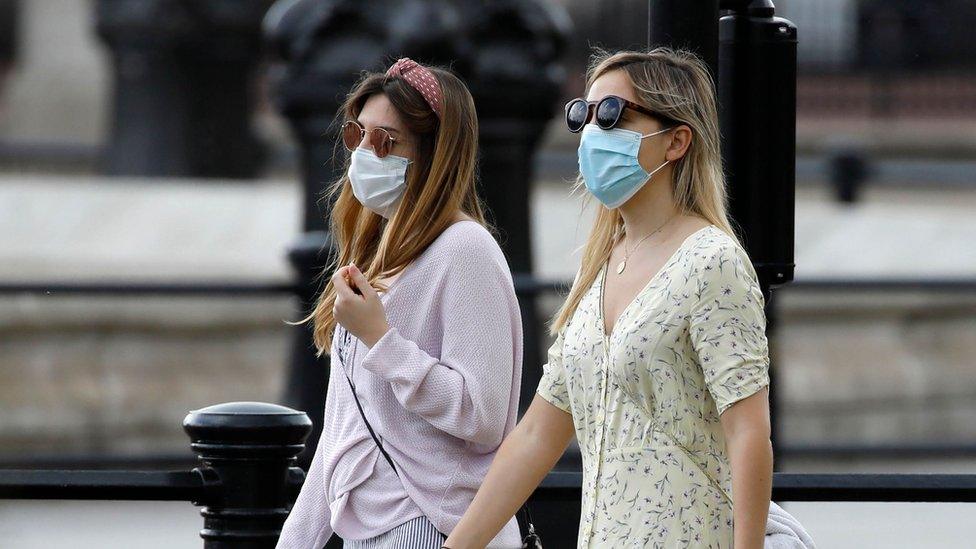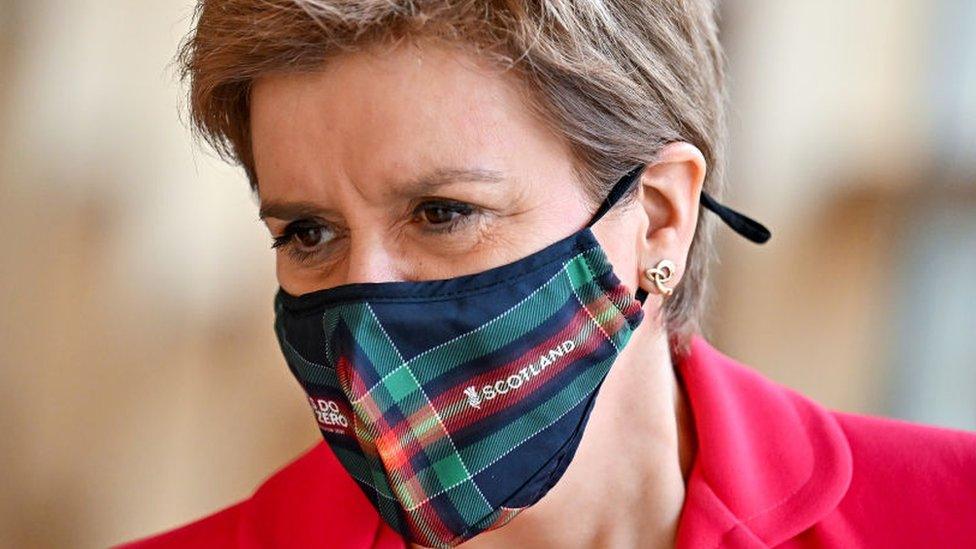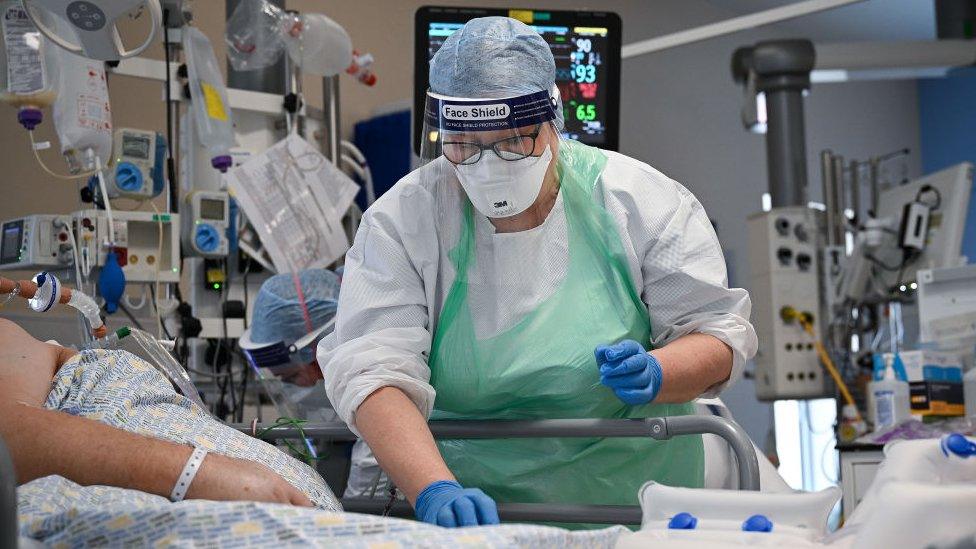Covid in Scotland: Decision due on mask requirements
- Published

Nicola Sturgeon is to confirm whether Scotland's last remaining Covid regulations - over the wearing of face coverings - will be lifted next week.
The first minister will update MSPs on whether the requirement to wear masks in shops and on public transport will end as planned on 4 April.
All of Scotland's other Covid-19 rules have now been converted into guidance.
But ministers decided to keep the rule on face coverings for an extra few weeks due to a spike in new cases.
Ms Sturgeon described this as a "temporary, precautionary" move, and said the expectation was that it would only last until early April.
The opposition Conservatives have urged the government to "trust the public" and bring legal requirements to an end.
A leading infections expert told the BBC masks should still be worn on public transport and in healthcare settings when legal enforcement are dropped.
Transmission of the virus recently hit record levels in Scotland, with one in 11 Scots estimated to have the virus in the week ending 20 March.
The number of people in hospital with the virus has also hit record highs, with 2,383 being treated for a recently confirmed case of Covid-19 on Monday.
On Wednesday, Deputy First Minister John Swinney said he had tested positive for the virus and was self-isolating.
However, the country's remaining restrictions have continued to be phased out, with ministers pointing to the low number of people in intensive care - currently sitting at 20 - as evidence that vaccines are helping prevent severe illness.
Allow X content?
This article contains content provided by X. We ask for your permission before anything is loaded, as they may be using cookies and other technologies. You may want to read X’s cookie policy, external and privacy policy, external before accepting. To view this content choose ‘accept and continue’.
On 21 March, the requirement for businesses to collect customer contact details and follow government guidelines was scrapped, with firms and services instead urged to take "reasonably practical measures" to reduce the spread of the virus.
The mandatory wearing of face coverings in enclosed public places was also to be converted to guidance at this stage, but Ms Sturgeon said it was prudent to keep it in place for "a further short period".
She said this would "provide some additional protection - particularly for the most vulnerable - at a time when the risk of infection is very high".

Nicola Sturgeon described the decision to extend mask rules as a "temporary" one
Ms Sturgeon's cabinet discussed the latest data on Tuesday, but no announcement was made in parliament with Ms Sturgeon attending the Duke of Edinburgh's memorial service in London.
A decision is expected this week, with Holyrood due to be in recess for the first two weeks of April.
Consideration is also being given to reviewing Covid-related restrictions in hospitals, such as isolation and distancing requirements, in order to increase capacity.
There had been calls for changes to help ease pressure on services, with waiting times at accident and emergency rooms hitting a record high on Tuesday.
On Monday, Ms Sturgeon said "these things are being looked at very actively".
She said: "We have all along got a balance to strike - and its not always an easy balance - between controlling the virus and minimising the harm that is caused by the measures to control the virus, and that has been a recurring theme throughout the pandemic.
"In broader society we have taken away all of the legal measures with the exception of the continued requirement to wear face coverings, and in the health and care sector we want to continue to protect patients and staff from the risks of transmission, but we do recognise that that results in reduced capacity in our hospitals."

Staff at hospitals across Scotland are facing capacity issues
Covid rules are being phased out across the UK, with masks now only compulsory in health and social care settings in Wales.
The legal requirement to wear face coverings was dropped in England on 16 March, while from Friday lateral flow tests will only be free for over-75s and those with weakened immune systems.
Testing is being wound down more gradually in Scotland, but the population-wide testing and contact tracing system will shut down by the end of April.
Dr Christine Tait-Burkard, a leading infections expert at University of Edinburgh, told BBC Radio's Good Morning Scotland masks should still be worn in high risk environments such as public transport and healthcare settings but legal enforcement should be dropped.
She said cases in the wave of the Omicron sub-variant affecting Scotland had dropped off quickly in Germany and Netherlands, despite them removing legal mask requirements.
"We are getting much less protection especially of the BA.2 subvariant because we need to inhale much fewer virus particles than we used to," Dr Tait-Burkard said.
"The surgical and cotton masks just allow for a little more of the virus to get through. They are still very good for people who are lower risk - they stop them shedding a lot of virus into the environment.
"For people who are more vulnerable it is probably the moment to increase to an FFP3 mask just until the pressure in the environment from so many people infected actually decreases."
She advised more vulnerable peple to "evaluate your personal risk" when going to high risk areas where there are lots of people and little ventilation.
'Don't overburden staff'
Dr Lewis Morrison, chairman of the British Medical Association Scotland, said the NHS was still struggling to deliver services because of pressure on resources - particularly staff shortages caused by Covid.
"This is a disease that still kills peoples so caution is still required. The idea that we can just treat this like a bad cold and go to work anyway - those days are over," he told GMS.
"Once again we just have to ask for patience from people until the NHS can work a bit normally as Covid cases recede."
He said staff recruitment was important but retaining current staff was the priority.
"The way you look after your staff is to not overburden them, you don't ask them to do more when they've already spent two years doing more - it is about realism for the coming months," Dr Morrison added.
The Scottish Conservatives have called on the Scottish government to "give up control" of Covid restrictions.
Leader Douglas Ross said Ms Sturgeon "can't use the higher case rates that she has completely failed to reduce as an excuse to delay or backtrack on lifting the remaining restrictions".
Scottish Labour meanwhile has called for more support to be given to hospitals, saying that lives were being put at risk despite the "tireless" work of staff.